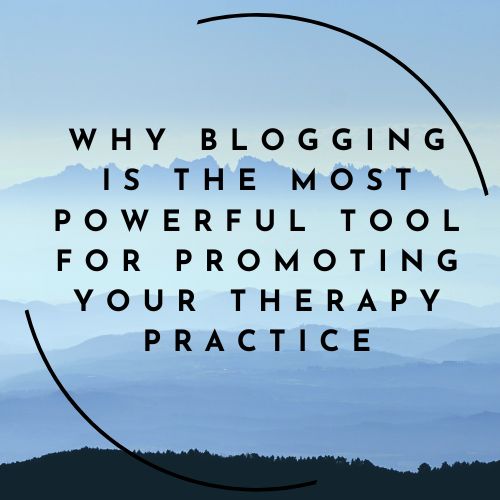A blog is one of the most powerful tools a therapist can use to build credibility, attract the right clients, and improve SEO. It’s more than just a way to add content to your website—it’s a way to demonstrate your expertise, educate potential clients, and create a meaningful connection before they even reach out.
Yet, many therapists either don’t have a blog or struggle to maintain one consistently. Others may feel unsure about what to write about or whether clients even read blogs. The truth is, a well-maintained blog can be a game-changer for your private practice.
Learn More About My Writing Services for Therapists
✔ Why a Blog is Essential for a Therapist’s Website
Therapists who actively maintain a blog benefit in multiple ways:
- Builds trust and rapport – Many potential clients hesitate before booking a session. A blog allows them to get to know your approach, values, and personality before they commit.
- Addresses client concerns in a safe, informative way – Some clients may be nervous or skeptical about therapy. Blog content that answers common fears (“What to Expect in Your First Therapy Session”) can help ease that uncertainty.
- Expands your reach beyond word-of-mouth referrals – Clients searching online for support may discover your practice through a blog post that speaks directly to their needs.
- Encourages engagement and social sharing – A valuable blog post can be shared on social media, in newsletters, or even linked by other professionals, increasing visibility for your practice.
- Differentiates you from other therapists – A blog allows you to highlight your unique approach and niche expertise, making it easier for potential clients to see why you’re the right choice.
✔ What the Best Therapist Blogs Include
Not all blogs are effective. The most successful therapist blogs share these key characteristics:
- They focus on client concerns, not therapist credentials. Instead of writing about why you love therapy, effective blogs focus on the issues your potential clients are facing and how therapy can help.
- They provide actionable value. Posts that offer tips, strategies, or insights (e.g., “5 Ways to Manage Stress Between Therapy Sessions”) keep readers engaged.
- They are optimized for SEO. Using the right keywords, structured headings, and internal links ensures your blog is visible in search engines.
- They have a professional but approachable tone. The best therapy blogs feel warm, informative, and accessible—not overly clinical or detached.
- They maintain a regular posting schedule. Blogs that are updated consistently (even just 1-2 times per month) perform better than those that go dormant.
✔ How to Improve Your Therapy Website With Blogging
If you don’t already have a blog—or if yours hasn’t been updated in months—here are some steps to make it a valuable asset for your therapy practice.
1. Write for Your Ideal Client, Not Other Therapists
Many therapists fall into the trap of writing blogs that sound like academic papers or professional journal articles. Instead, think about what your ideal client is searching for online and write in a way that resonates with them.
- ✅ Instead of: “The Role of Cognitive Restructuring in CBT Frameworks”
- ❌ Try: “How Changing Your Thought Patterns Can Help with Anxiety”
Your blog should feel like a conversation with a client, not a lecture.
2. Use a Mix of Timely and Evergreen Content
The best therapy blogs balance evergreen topics (“How to Manage Anxiety”) with timely issues (“Coping with Holiday Stress”) to keep content relevant.
- Evergreen Posts: These stay relevant year-round and continue attracting readers over time.
- Seasonal or Timely Posts: These connect with what clients are experiencing in the moment (e.g., “Dealing with Loneliness on Valentine’s Day”) and show that your content is fresh and current.
3. Make Your Blog Easy to Navigate
A cluttered or unorganized blog can turn visitors away. Ensure that:
- Your most important blog posts are featured or easy to find.
- There’s a search function so clients can find posts relevant to their concerns.
- You link between related blog posts to keep readers engaged.
4. Optimize Each Post for SEO
Even if your blog has great content, it won’t help your practice unless people can find it in Google searches.
To improve SEO:
- Include keywords clients search for (e.g., “CBT for anxiety”, “signs of burnout”, “relationship counseling in [your city]”).
- Use short, engaging paragraphs and clear headings to improve readability.
- Add internal links to other pages on your site (e.g., linking a blog post on anxiety to your “Anxiety Treatment” service page).
5. Hire a Professional Therapy Website Writer to Ensure Quality & Consistency
Many therapists understand the importance of blogging but struggle with finding the time to write. Others worry about writing in a way that is engaging, SEO-friendly, and clinically responsible.
If you don’t have the time or energy to maintain your blog, consider outsourcing your blog writing to a professional who specializes in therapy content. A skilled therapy writer can ensure your blog is:
- Consistently updated
- Written in your unique voice
- Optimized for SEO and client engagement
Make Your Blog Work for You
A well-maintained blog isn’t just a marketing tool—it’s a way to connect with clients before they ever book a session. By providing valuable, client-focused content, you:
✔ Establish yourself as an expert
✔ Improve your website’s visibility in search engines
✔ Offer potential clients reassurance before they reach out
If you’re ready to create a high-quality, consistent blog that brings in real results, I can help. I take the writing off of your plate so that you can focus on your clients and I can focus on bringing more clients to you.

